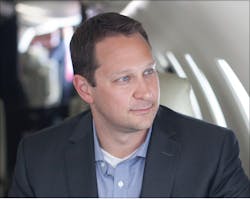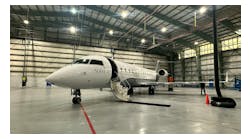It started with just a few coronavirus cases being reported. As the coverage extended across media outlets in nearly every corner of the world, the world went into lockdown to flatten the curve. But before the travel restrictions were imposed, many business travelers were looking for ways to get back to their homes as quickly as possible. This need turned into a surge of private jet flight requests, sending operators and charter providers into a tailspin.
And then things went quiet.
As the business aviation industry began flickering into a flame after the initial lockdown, we noticed a few immediate changes. However, those changes soon amplified and shifted into a completely new way of traveling, which is where we’re at now.
Business travel takes a turn
In the business world, meetings that once saw executives fly to New York or Chicago or Los Angeles so people could shake hands and review deals in person are being relegated to the virtual world--from boardrooms to zoom ‘rooms.’ One of our clients, a motivational speaker who was often in several different cities every week for major conferences and events, hasn’t flown for months.
While private aviation has seen an increase over the summer and now the fall, especially among first-time private flyers, lockdowns have put a pause on business travel. Restrictions have often meant it’s just not possible to travel to some cities and states, but organizations also want to help keep their senior management teams safe. As we’ve discovered, many business meetings can be done virtually. Of course, those ‘meetings’ don’t have the same energy and excitement, but they allow business to carry on in a safe way, and that’s important.
Among those business travelers who have made trips, the aviation experience does look a little different. What once began as a firm handshake between passengers and crew has shifted to a nod and smile prior to boarding. Pilots and crew members are also being screened prior to boarding the aircraft, so that’s created a lot of peace of mind for travelers as well.
We’ve also seen several requests for fewer flight attendants on shift during the flight as well. By reducing the number of people on the aircraft, we’re further improving the experience for our travelers while reducing their health-related concerns.
The cleaning procedures on flights have also changed quite a bit. Although cabin cleanliness has always been a priority, sanitizing has played a crucial role in the preparation procedures. Many of our heavily vetted and approved vendors have employed strict standards to ensure the aircraft is both suitably cleaned and sanitized before passengers are allowed to come aboard the jet.
A legal loophole through popular business corridors
With the quarantine belt being loosened, corporate leaders are ready to get back to business. For some, this means visiting workplaces in different countries, even though travel restrictions in these areas are still in place.
While domestic travel within the United States is much less challenging and a lot more common, we’re still seeing requests for international business travel. Many of these destinations have heavy restrictions in place, but there are legal and safe ways around them. Whether that includes a negative COVID test or acquiring a special travel visa, we’re meeting those requirements head-on so our clients can access these locations.
In Europe specifically, business-related flights are funneled through a ‘business corridor’ that allows flights entering the country to proceed so long as the requirements have been met. In many cases, we’re seeing a delay in permits. Some may take up to 36 or 48 hours to receive, instead of the usual 12 hours, but most travelers are prepared to wait, especially if it means trip planning can continue successfully.
Mitigating the costs & environmental impact with group charters
While business travelers may have been sitting out for meetings, it’s likely they were among those who have been flying privately for pleasure. With fewer touch points, less populated airports, and an entire jet cabin to themselves and those in their bubbles, the chance of catching the virus on a private flight is really low. And that has really appealed to those who sat on the sidelines during the lockdown phase, perhaps are less busy with work travel commitments, and want to enjoy some down time while they can.
Another trend that’s recently emerged is a form of private flight carpooling. Travelers are filling aircraft seats with friends and family members in their social bubbles. By doing this, they’re sharing the cost, which is helpful for their budgets and bottom lines. Overall, it’s been a really positive experience for them.
We’re also reminding those ‘flight-pooling’ travelers that we can further reduce the impact on the environment through our eco-jet program. Several years ago, Stratos formed a partnership with TerraPass to help clients offset their carbon footprint. Through their charter booking, clients can choose to purchase a carbon credit. A credit equates to roughly one percent of the total quote, and they can then be used to fund greenhouse gas reduction initiatives, wind energy production, and more. The program has made a huge difference since its inception in 2007, and many of our clients are really excited to help offset the effects of carbon emissions.
Business aviation in the future
It’s still a little too early to tell what the post-pandemic future holds for business aviation, but we’re really confident that as it becomes safe, people will want to resume having some meetings in-person and attend small events. There’s a lot to be said for
If they weren’t already flying privately for pleasure, it’s likely that will be a consideration for them now, and we’ll continue to see a rise in charter bookings.
It’s also really easy to see the benefit of chartering a private jet out of smaller, regional airports. By checking in at a fixed-base operator instead of a busy, commercial airline counter, people see greater protection but also the chance to support the business ecosystem of those airports, which provide employment and contracts to transportation, catering and more. Many of the catering crews and ground transportation providers are seeing a positive trickle-down effect as more private charters are being booked.
Overall, the pandemic has created not just challenges for the business aviation industry, but also the opportunities. We’re all learning how to adapt in the new era of private aviation for both leisure and business travel, and it’s afforded us the opportunity to become a little more innovative, meet new clients, and rise to the occasion. I’m very hopeful that the private aviation sector will continue to expand as we move out of the shadow of the pandemic.
Joel Thomas still remembers the day he fell in love with aviation: His dad, who had just earned his private pilot’s license, picked Joel up from school, took him to the Orlando Executive Airport and told him they were going for a burger—in the Bahamas. Soaring above the barrier islands in his dad’s 1960 V-tail Bonanza M35 for the first time, Joel was hooked.
After attending the University of Central Florida where he worked toward a finance degree, Joel went on to work as an investment advisor at a large investment firm. His passion for aviation led him back to the local airport where he spent so many boyhood summers, and to a chance encounter in which Joel’s dad hinted he would make a great jet charter broker.
In 2006, Joel founded Stratos Jet Charters. Since then, Joel has focused on guiding his company by a vision to always do what’s best for the customer, to help them make informed buying decisions, and to always recommend only the safest options. Through his advocacy for safety in the private jet charter services industry, he has served as president and chairman of the Air Charters Association of North America (ACANA), and Stratos was one of the first jet charter companies to become an ARGUS Certified Broker.
Joel has led Stratos toward a number of significant firsts, including the Marketplace platform that gives travelers unrivaled access to aircraft availability and quotes, and the SOAR program that combines the guaranteed availability of membership with the flexibility and savings of on-demand jet charters. Nearly 15 years into the business and now with his own pilot’s license, Joel is still as passionate about flying and providing a private flying experience that raises the bar for safety, service and client education.





